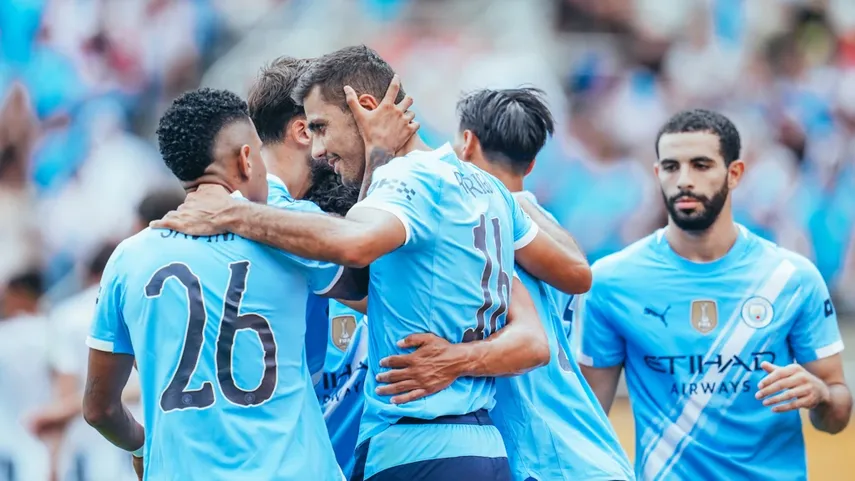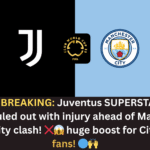Manchester City 5 : 2 Juventus (Jeremy Doku 9′, Pierre Kalulu (OG) 26′, Erling Haaland 52′, Phil Foden 69′, Savinho 75′

Manchester City delivered a statement performance at the Camping World Stadium in Orlando, dismantling Juventus 5-2 in a scintillating display that secured their position as Group G winners in the FIFA Club World Cup. Pep Guardiola’s men needed nothing less than victory to guarantee their progression to the round of 16 as group leaders, and they responded with a breathtaking exhibition of attacking football that left the Serie A giants reeling.
The final scoreline of 5-2, while comprehensive, only begins to tell the story of City’s dominance on a warm Florida evening. From the opening whistle to the final moments, Guardiola’s side controlled proceedings with a fluidity and intensity that has become their trademark, pinning Juventus back for vast stretches of the encounter and creating chances at will.
Goals from Jeremy Doku, an unfortunate own goal from Juventus defender Pierre Kalulu, Erling Haaland, Phil Foden, and Savinho painted the picture of a team firing on all cylinders. While Juventus managed to find the net through Teun Koopmeiners and Dusan Vlahovic, their efforts were mere footnotes in a match that belonged entirely to Manchester City.
First Half: Setting the Foundation
The match exploded into life within the opening ten minutes, setting the tone for what would become an unforgettable evening of football. Jeremy Doku, operating from his favored left-wing position, announced his intentions early, ghosting past defenders with the kind of direct running that has made him such a valuable asset to Guardiola’s system. In the 9th minute, his persistence paid dividends as he found space in the Juventus penalty area and finished with the composure of a seasoned goalscorer.
The early goal seemed to energize City’s entire system. The midfield partnership of Rodri and Tijjani Reijnders began to assert their authority, with Rodri making his first start since September following his lengthy injury layoff. The Spanish midfielder’s presence was immediately felt, providing the kind of positional discipline and passing range that has made him indispensable to City’s success in recent years. His partnership with Reijnders, the Dutch international who has quickly adapted to Guardiola’s demands, created a platform for City’s attacking players to flourish.
However, football’s capacity for drama was on full display just two minutes later. Ederson, usually so reliable with his distribution, made an uncharacteristic error that gifted Juventus an equalizer. The Brazilian goalkeeper’s misplaced pass fell directly to Teun Koopmeiners, who showed excellent composure to level the scores at 1-1. It was a reminder that even in dominant performances, individual mistakes can change the complexion of matches in an instant.
The equalizer might have deflated a lesser team, but Manchester City’s response was immediate and emphatic. Rather than retreating into their shells, they increased the tempo and began to overwhelm Juventus with wave after wave of attacks. The Italian side, managed by Igor Tudor, found themselves pinned back in their own half, unable to establish any meaningful possession or territorial advantage.
City’s second goal arrived in the 26th minute through the most unlikely of sources. Matheus Nunes, deployed at right-back in one of Guardiola’s tactical innovations, delivered a cross that caused chaos in the Juventus penalty area. Pierre Kalulu, under pressure from multiple City attackers, could only divert the ball into his own net, restoring City’s advantage and providing a perfect example of how sustained pressure can force defensive errors.
The own goal was symptomatic of Juventus’s struggles throughout the first half. Tudor’s side simply couldn’t cope with City’s pressing intensity and positional rotations. Players were constantly out of position, communication broke down under pressure, and the usually solid Italian defense looked uncharacteristically fragmented.
As the first half progressed, City’s dominance became increasingly apparent. Jeremy Doku was causing havoc down the left flank, combining brilliantly with Rayan Ait-Nouri in a partnership that threatened to unpick Juventus’s defensive structure with every attack. The Algerian full-back, building on his impressive debut against Al Ain, provided width and pace while never neglecting his defensive responsibilities.
On the opposite flank, Matheus Nunes was enjoying one of his finest performances in a City shirt. The Portuguese international’s versatility has always been one of his strengths, but his adaptation to the right-back role was particularly impressive. His ability to contribute in both phases of play, defending solidly while providing attacking thrust, exemplified the kind of tactical flexibility that Guardiola demands from his players.
In the center of the pitch, Rodri and Reijnders were conducting the orchestra with precision and authority. Rodri’s return to the starting lineup after his lengthy absence was seamless, as if he had never been away. His positioning, passing, and leadership qualities were all on display, reminding everyone why he is considered one of the finest defensive midfielders in world football.
Reijnders, meanwhile, was showcasing the qualities that convinced City to bring him to Manchester. His ability to break lines with his passing, arrive late in the penalty area, and provide a goal threat from midfield positions was causing Juventus constant problems. The Dutch midfielder’s movement between the lines was particularly effective, creating space for his teammates while always being available as a passing option.
Second Half: The Floodgates Open
If the first half had established City’s dominance, the second half would confirm their superiority beyond any doubt. Pep Guardiola made a crucial change at halftime, introducing Erling Haaland for Omar Marmoush. The Norwegian striker, who had been working his way back to full fitness, brought an immediate physical presence and goal threat that Juventus simply couldn’t handle.
The impact was almost instantaneous. In the 52nd minute, Haaland found himself in the right place at the right time to convert a cross from Matheus Nunes, extending City’s lead to 3-1. The goal was classic Haaland – no frills, just pure predatory instinct and clinical finishing. More importantly, it demonstrated the striker’s hunger and determination to make up for lost time following his recent absence from the starting lineup.
With a two-goal cushion, City could have been forgiven for taking their foot off the accelerator. Instead, they continued to press forward with the same intensity and purpose that had characterized their first-half performance. The fluidity of their passing, the precision of their movement, and the relentless nature of their pressing left Juventus looking increasingly ragged and disorganized.
Phil Foden’s introduction from the bench in the 69th minute brought fresh legs and renewed attacking impetus. The English midfielder has been in exceptional form this season, and his impact was immediate. His goal in the 69th minute was a thing of beauty, showcasing the kind of technical ability and spatial awareness that has made him such a crucial component of City’s success.
Foden’s strike effectively killed the match as a contest, but City weren’t finished. Savinho, the young Brazilian winger who has been gradually establishing himself in Guardiola’s plans, added the fifth goal in the 75th minute with a spectacular effort that had the Orlando crowd on their feet. The goal was a perfect encapsulation of the confidence and swagger that City had displayed throughout the match.
The Brazilian’s strike was particularly significant from a personal perspective. Young players often struggle with confidence in big matches, but Savinho’s willingness to shoot from distance and the quality of his finish demonstrated the kind of mentality that suggests he has a bright future at the club. For Guardiola, who has built his reputation on developing young talent, Savinho’s performance was a particularly pleasing aspect of the evening.
Even with a commanding 5-1 lead, City’s intensity never wavered. Their pressing remained high, their passing remained crisp, and their movement remained purposeful. It was a masterclass in maintaining standards even when the result was no longer in doubt, reflecting the professional approach that Guardiola has instilled throughout his squad.
Juventus did manage a consolation goal through Dusan Vlahovic in the 83rd minute, capitalizing on a momentary lapse in concentration from Manuel Akanji. The Serbian striker showed excellent movement to get in behind the City defense and finish clinically, providing a brief moment of celebration for the traveling Juventus supporters. However, the goal was merely cosmetic in the context of the match, with City’s superiority having been established long before.
Tactical Analysis
From a tactical perspective, Manchester City’s performance was a clinic in modern football. Guardiola’s decision to deploy Matheus Nunes at right-back was vindicated by the Portuguese player’s outstanding display, while the midfield partnership of Rodri and Reijnders provided the perfect balance of defensive solidity and creative impetus.
The pressing structure implemented by City was particularly effective in disrupting Juventus’s build-up play. By pressing high and in coordinated fashion, they forced the Italian side into hurried passes and uncomfortable positions, creating numerous turnovers in dangerous areas. This approach not only limited Juventus’s attacking opportunities but also created the foundation for City’s own attacking moves.
Juventus, under Igor Tudor’s guidance, struggled to find any consistent rhythm or pattern of play. Their attempts to play out from the back were repeatedly thwarted by City’s aggressive pressing, while their direct approach lacked the precision and coordination necessary to trouble City’s well-organized defense.
The Italian side’s midfield was particularly overrun, with City’s numerical and qualitative superiority in the center of the pitch proving decisive. Without the ball, Juventus found themselves constantly chasing shadows, as City’s players rotated positions and created overloads in different areas of the pitch.
Individual Performances
Jeremy Doku emerged as the standout performer in a team full of excellent individual displays. The Belgian winger’s combination of pace, skill, and end product was too much for Juventus to handle. His goal was well-taken, but it was his overall contribution to City’s attacking play that marked him out as the man of the match. His link-up play with Rayan Ait-Nouri down the left flank was a constant source of danger, creating space and opportunities for his teammates.
Rodri’s return to action was another major positive for Manchester City. The Spanish midfielder looked as if he had never been away, controlling the tempo of the match and providing the kind of positional discipline that allows his more creative teammates to flourish. His performance was a reminder of just how important he is to City’s system and bodes well for their remaining fixtures in the competition.
Matheus Nunes deserves special mention for his versatility and application. Deployed in an unfamiliar right-back role, he not only fulfilled his defensive duties competently but also made significant contributions in attack. His assist for Haaland’s goal and his overall link-up play demonstrated the kind of adaptability that Guardiola values so highly in his players.
Erling Haaland’s second-half introduction was perfectly timed and expertly executed. The Norwegian striker showed not just his goalscoring ability but also his work rate and commitment to the team cause. His performance suggested that he is ready to resume his role as City’s primary attacking threat.
For Juventus, the evening was largely one to forget, but Dusan Vlahovic’s late goal at least provided some consolation. The Serbian striker worked tirelessly throughout the match and deserved his goal, even if it came when the match was already decided.
Implications and Looking Forward
This emphatic victory does more than just secure Manchester City’s progression to the round of 16 as Group G winners. It sends a clear message to their potential opponents in the knockout stages that they remain a formidable force despite some of the challenges they have faced this season.
The performance also highlighted the depth and quality of Guardiola’s squad. Even with several players still working their way back to full fitness, City were able to produce a display of this caliber against quality opposition. This bodes well for their chances in the later stages of the competition.
For Juventus, this defeat will serve as a reality check about the work still required to compete at the highest level. While they showed moments of quality, particularly in their two goals, the overall performance highlighted areas that need improvement if they are to progress further in the competition.
The FIFA Club World Cup continues to provide fascinating insights into the current state of world football, and Manchester City’s performance against Juventus demonstrated why they remain one of the teams to beat in any competition they enter. With Rodri back to full fitness and the attacking players firing on all cylinders, City will be confident of going deep into this tournament and potentially adding another trophy to their ever-growing collection.
As the competition moves into its knockout phases, all eyes will be on whether Manchester City can maintain this level of performance when the stakes become even higher. If this display against Juventus is anything to go by, they will take some stopping.















